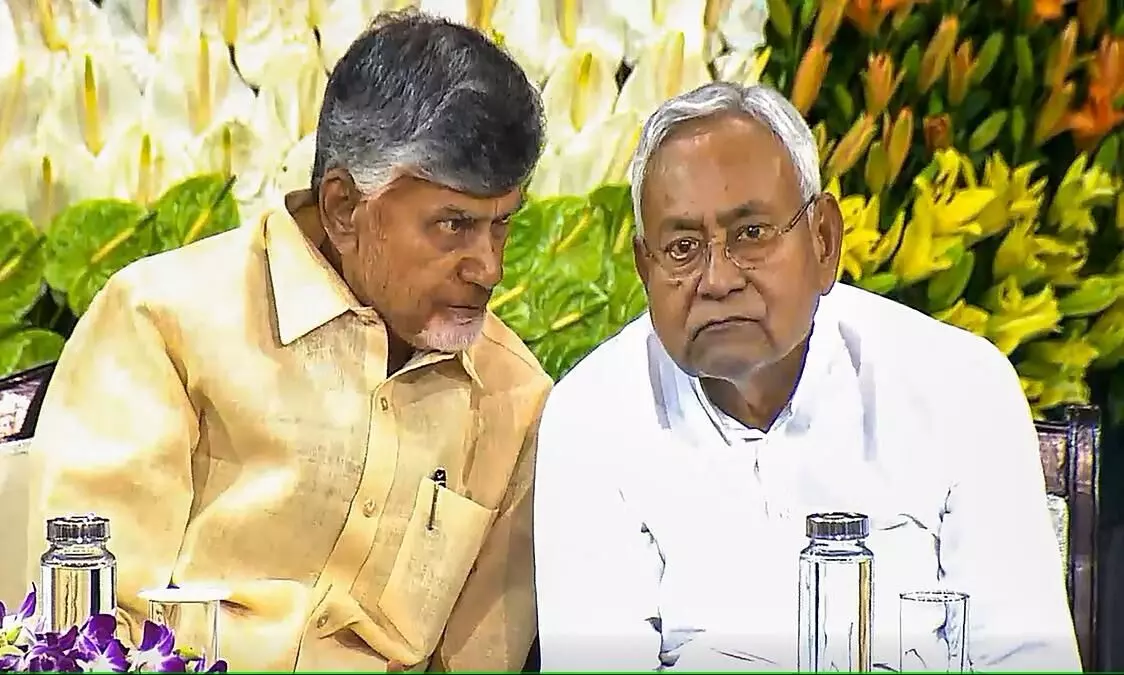
NDA allies, including JD(U) and TDP, vow to oppose Waqf (Amendment) Bill
text_fieldsThe All India Muslim Personal Law Board (AIMPLB) announced that key political parties, including the Janata Dal (United) and the Telugu Desam Party (TDP), have pledged to oppose the Waqf (Amendment) Bill, 2024. This bill, currently under review by a joint parliamentary committee, has sparked significant controversy and concern among various Muslim organisations.
The AIMPLB revealed that recent meetings with prominent political figures have solidified this opposition. Leaders from the Janata Dal (United), represented by Bihar Chief Minister Nitish Kumar, and the Telugu Desam Party, led by Andhra Pradesh Chief Minister Chandrababu Naidu, have both expressed their commitment to resisting the bill.
Additionally, other prominent political leaders, including Tejashwi Yadav and Uddhav Thackeray, have also declared their opposition to the bill. The Tamil Nadu Chief Minister has similarly joined in opposing the proposed legislation. These assurances come amid widespread unease from Muslim bodies regarding the bill’s implications for Waqf properties.
The Waqf (Amendment) Bill, 2024 aims to reform the management and administration of Waqf properties, ensuring better efficiency and safeguarding women’s inheritance rights. Notably, it seeks to remove Section 40, which grants Waqf boards authority to determine Waqf property status and instead assigns this role to the district collector.
The bill also proposes changes to the composition of the Central Waqf Council and state Waqf boards, including increased representation of Muslim women and non-Muslims, and the establishment of a separate board for Boharas and Aghakhanis.
The bill has already faced significant resistance during its introduction stage in the Lok Sabha, with strong objections from partners of the INDIA alliance. Despite support from the BJP's key allies, JD(U) and TDP, there has been notable contention surrounding the bill’s provisions.
In a recent joint press conference, AIMPLB president Khalid Saifullah Rahmani indicated that Muslim organisations are actively engaging with various political leaders to ensure their opposition to the bill. Rahmani emphasised that the issue transcends Hindu-Muslim divides, focusing instead on secular principles and the protection of Waqf properties.
Simultaneously, the 31-member Joint Parliamentary Committee (JPC), chaired by BJP MP Jagdambika Pal, held its first meeting on the bill. During this session, YSR Congress Party (YSRCP) MP V Vijayasai Reddy expressed his opposition to the bill, citing concerns from various stakeholders and signalling intent to submit a dissent note. The YSRCP had previously supported BJP legislation but remains critical of the current bill.
AAP MP Sanjay Singh, also a JPC member, voiced his concerns about potential government interference in religious affairs, arguing that such actions undermine constitutional rights granted to religious groups. Singh vowed to oppose the bill, stressing the need to protect these constitutional freedoms.
JPC head Jagdambika Pal has promised comprehensive discussions on the bill, inviting various stakeholders, including members of state Waqf boards and minority organisations, to provide their input.
Despite this, the AIMPLB has reported that it has not yet received an invitation to participate in these discussions. The board expressed frustration with the perceived lack of engagement from the government, asserting that the bill, in its current form, is unacceptable and threatens the integrity of Waqf properties.
The AIMPLB has called upon all secular and opposition parties to unite in opposing the bill and is exploring various legal and democratic avenues to challenge the proposed legislation. The board has indicated that it may mobilise nationwide protests if necessary.






















